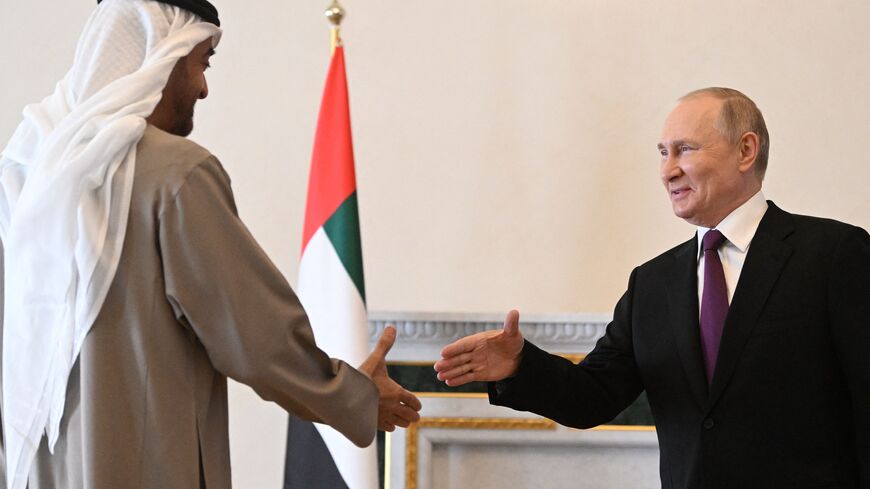DUBAI — Gulf Cooperation Council (GCC) countries took a neutral stance amid Western sanctions placed on Russia for its war on Ukraine starting about one year ago, yet their role has been anything but passive after a chain reaction of events jolted regional economies and further shifted political relationships.
The Russian invasion of Ukraine on Feb. 24, 2022, initiated snowballing global political and economic effects that have rolled into 2023, with monetary and export sanctions that continue to disrupt global supply chains, and energy market disruptions that significantly affected Middle East markets.
The region’s mostly impartial position gave it economic and also political opportunities. It allowed the United Arab Emirates (UAE) and Saudi Arabia to take on the role of negotiator between the United States and Russia for the exchange of two prisoners in December, according to the UAE’s government news agency, and benefit from relationships with both countries.
Abu Dhabi and Riyadh facilitated the prisoner exchange between the United States and Russia in December, leading to the release of US basketball star Brittney Griner after nearly nine months in detention. In return, the United States released Russian arms dealer Viktor Bout.
Two months prior, Saudi Arabia and Turkey mediated a large-scale prisoner swap, where almost 300 people, including 10 foreigners, were released. Two Americans, a Swede, a Croatian, five Britons and a Moroccan were among those released. In return, 55 Russians and pro-Moscow Ukrainians were sent back to Moscow.
.subtext-iframe{max-width:540px;}iframe#subtext_embed{width:1px;min-width:100%;min-height:256px;}Saudi Arabia's Foreign Minister Faisal bin Farhan Al Saud re-affirmed this position at the Munich Security Conference on Saturday, stressing that Riyadh “continues dialogue with Kyiv and Moscow."
At the Emirates Policy Center Abu Dhabi Strategic Debate in November 2022, Anwar Gargash, senior diplomatic adviser to the UAE president, said that “[while] the UAE has no interest in choosing sides between great powers, our primary strategic relationship remains unequivocally with the United States.”
“Economic ties can exist separately from those concerns,” he added, stating that the UAE will champion an open and global trading system as it continues its mission to bring in global talent and investment to further grow its economy.
Saudi Arabia echoed a similar strategy with its declaration to put “Saudi first” in spending and other global matters in January when the kingdom’s Finance Minister Mohammed Al-Jadaan made the pivotal announcement during a panel discussion at the 2023 World Economic Forum in Davos, Switzerland.
Sanction-hit Russia displays combat-tested arms at UAE fair https://t.co/Ll7px67DFs
— Al-Monitor (@AlMonitor) February 21, 2023
Demonstrating this approach was the decision of the OPEC+ alliance of oil-exporting countries, led by Saudi Arabia, to reduce oil production in October of last year against US requests. This caused US President Joe Biden to vow consequences for the move at the time, but it did not significantly disrupt the relationship, especially as OPEC+ did not boost production after Russian oil cuts this month.
Ryan Bohl, a senior Middle East and North Africa analyst at the Risk Assistance Network + Exchange, said that this policy shift is not new.
It first occurred around 2014 with the shale oil wars, he said. As the United States started importing less from Saudi Arabia, the kingdom began redirecting its exports to other countries.
“This is who the US has been dealing with for a while, but now it's blatantly obvious. Saudi Arabia and the other Gulf Arab producers will be making choices that make sense for their economies, and that might not always work out in the West's favor,” said Bohl, but it does not mean that the GCC is leaving the United States to work more closely with the East, as some have characterized recent events.
“We’re really entering a multipolar world, which resembles the 19th century more than the Cold War blocks. This means that Saudi Arabia will deal with China as long as it’s an advantage. If geopolitical conditions change, they’ll move away from China and shift to India, back to the West or sub-Saharan Africa,” he told Al-Monitor, with an “every person for themselves" approach.
This international policy has extended to other markets, including finance and real estate, as a high influx of Russian investment poured into a welcoming Gulf region.
Rents hit historic highs in Dubai this year, and the Russia war is the driving force that’s fueling it, contributing to the country’s recent economic gains during a global downturn, reported The Associated Press last week.
Gulf countries, mainly the UAE and then Qatar, have been major recipients of Russian real estate investment along with Turkey, said Bohl, in addition to direct financial injections.
Last week, the UAE authorized a license for Russia’s MTS Bank, which is not beholden to Western sanctions and serves as an example of how the country has become a financial haven for Moscow, the Financial Times reported, and it’s raising concern amongst Western nations enacting these restrictions.
“It's legal, but it’s risky. It's part of the reason that I think that the Financial Action Task Force is grey-listing the UAE, because they are in this space where they're willing to skirt the line of sanctions without quite crossing it,” Bohl said, adding that the Gulf hub is seeing money transferred through buying gold, diamonds, cryptocurrency and real estate.
“The UAE is very clear about its neutrality — that it is politically tolerant of dissidents all over the world,” he added. But, he said, if there were a secondary set of sanctions enacted forcing countries like Turkey and the UAE to pick a side, that’s when you could see a flight of Russians out of these countries.
On Wednesday, the European Union called for a 10th package expanding sanctions on Russian exports worth more than $13.2 billion to deprive the country of critical technology and goods such as electronics, specialized vehicles and machine parts.
It also called to restrict the export of advanced military technology goods, including controls over 47 new electronic components that can be used in Russian weapon systems such as drones, missiles and helicopters.


.jpg?h=484aaada&itok=l9O0K7bm)





